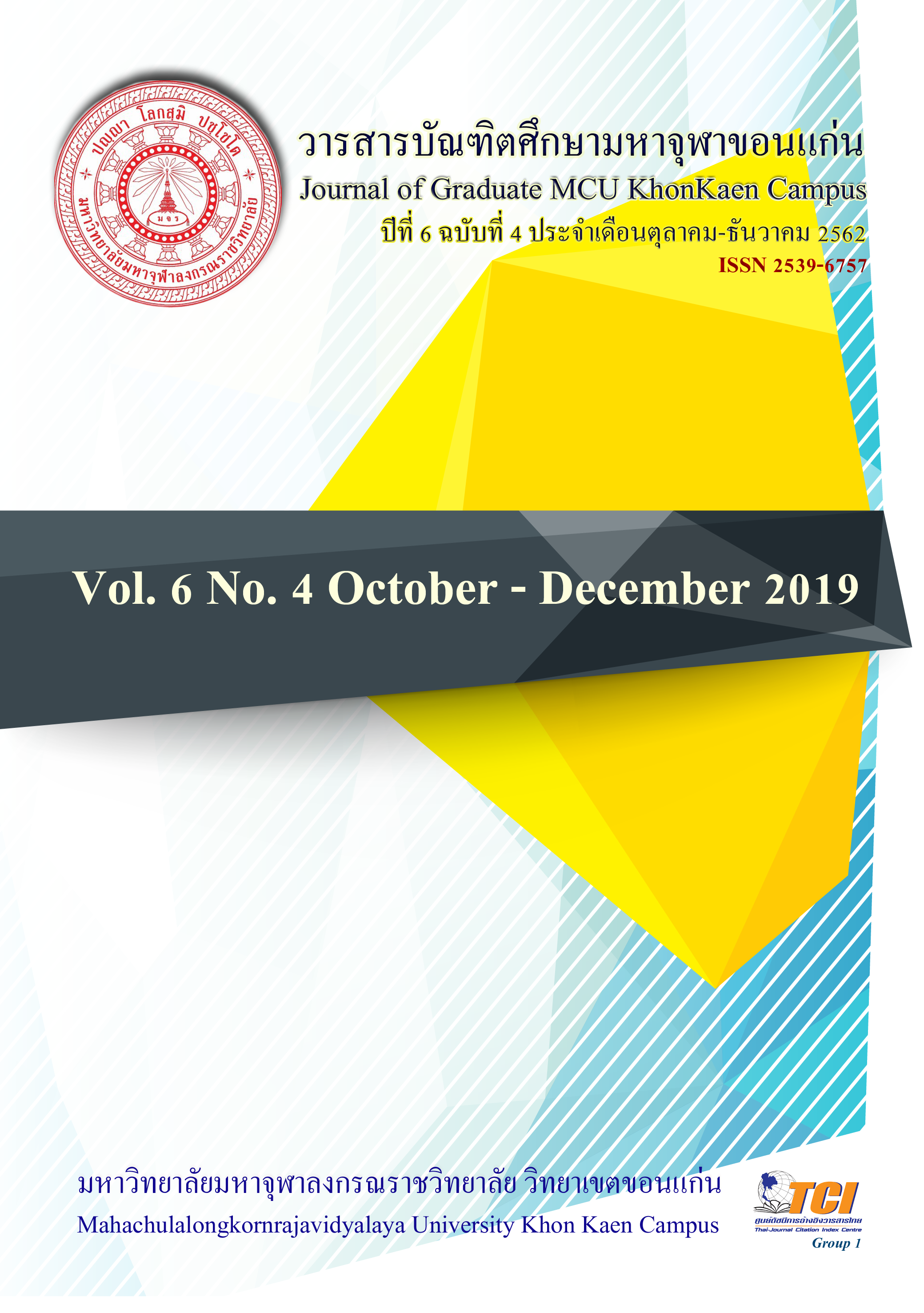State and Problems in Teaching Morals and Ethics in Jin Zhong Schools Area, Yonan Province, China
Main Article Content
Abstract
This study on the conditions and problems in teaching ethics and morals in schools in the Jin Zhong area, Yunnan, People’s Republic of China, was aimed at meeting the following two objectives: 1) to study the contexts and problems in teaching morals and ethics and 2) to present morals and ethics teaching guidelines. This study collected data from the subjects by using questionnaires. The subjects consisted of 320 students from schools in the Jin Zhong Area, Yunnan, People’s Republic of China. According to the findings, students (55.0%) believed overall morals and ethics taught by teachers to be at a high level while some students (3.1%) believed overall morals and ethics taught by teachers to be at a low level. Teachings concerning responsible actions had the highest teaching mean score, followed by the topic of social justice. Meanwhile, the topic with the lowest teaching mean score was the topic of having a public mind. Guidelines for teaching morals and ethics had the following three parts: 1) School Administrators, who should support activities to promote morals and ethics, educational media and teacher capacity development, 2) Teachers, who should use the method of emphasizing or repeating explanations on the consequences of wrongdoing in addition to behaving as good examples to students and 3) Students, who should behave morally and impart lessons to others by beginning with household members.
Article Details
References
Cranley Mary Elizabeth. (2003). TessaanSchool : The Moral Life of a Thai Primary School,” Dissertation Abstracts International, 64(5), 1531-A.
Department of Education. (2010). Growing Good. Bangkok: Department of Education.
Khanchai Athikiat, &Thanarak Santienkeaw. (2016). Intend Learning and New Learning Techniques. Retrieved November 20 2018, fromhttp://regis.skru.ac.th/RegisWeb/datafiledownload/25590714-15.pdf
Marayat Yotongyos & Pranee Sawadisup. (2014). Sample Size Determinations in Research. Retrieved July 5 2018, from http://www.fsh.mi.th/km/wp content/uploads/2014/04/resch.pdf
Moral School Center. (2017).Helping build good people for the country: Moral Family(2nd edition). Nonthaburi: Sahamitr Printing & Publishing Company.
Office of the Basic Education Commission. (2018). National Education Act B.E. 2542 (1999) and Amendments Second National Education Act B.E. 2545 (2002). Retrieved June 12 2018, from http://qa.ku.ac.th/photo_forweb/new%20web/education/docedu/d7.pdf
Phra Weera Sriphom, Surachai Piyanukool, &SatidPolcharoen. (2014). Problems of Organizing Moral and Ethical Activities in Schools under Buriram Primary Educational Service Area Office 3. Journal of BuriramRajabhat University, 6(1), 65-83.
Sarapee Wanthong & Chucheep Beadnok (2018). Role of Schools for Supporting Moral and Ethic Students in Sriput Schools Group umderSamutprakarn Primary Educational Service Area Office 1. Retrieved November 2 2018, fromhttp://www.ptu.ac.th/StudentServe/input/thesis/[1][221117104917].pdf
Siripetch Trisanawadee & Worasak Mahatthanobon. (2017). China’s Social Problems. Retrieved June 15 2018, from http://www.csc.ias.chula.ac.th/wp-content/uploads/2017/05/P41-130_SocialProblem.pdf
Supaporn Tewiya, Sirmsree Chaisorn, Varunee Boon-Long, & Ruetinan Samutthai. (2016). Public-mindedness of Chiang RaiRajabhat University’s Teacher Education Students Learning Through Service Learning Activities. Journal of Graduate Studies in Northern Rajabhat Universities, 6(11), 81-96.
Suttiwan Tuntirojanawon & Sasikarn Tawisuwan. (2009). Promotion the Effective Moral: A Case Study Children / Youth groups and Government Officials.Research Report. Bangkok: Department of Religious Affairs.
Suwimol Vongvanich. (2001). Classroom Action Research. Bangkok: Faculty of Education Chulalongkorn University.
Tarntip Chaiwohan and Worawit Chindapol. (2017). The Administrators’ Role in Development Teacher in Education Network Center Namphong – Karnaun for Education Support of School under the Office of Secondary Educational Service Area 25. Research 4.0 Innovation and Development SSRU’s 80th Anniversary, 20 March 2018. 1033-43.
Tawat Sriraksa, Wannika Chalakbang, &WaroPhengsawat. (2012). The Relationship between the Promotion of Morals for Basic Virtues of Students in Schools under the Offices of NakhonPhanom Educational Service Area. NakhonPhanom University Journal, 2(2), 46-51.
Wannapaisan, C.(2017). Research Methodology for Social Studies: Principle and Application. Chiang Mai: Krongchang Printing.
Wannapaisan, C.(2019). Social Studies Research Tools. Chiang Mai: Chiang Mai University Press.
Weerapong Tinsandee. (2007). The Student’s Ethics and Moral Development by Using Integrated Instructional Process at Sing-sa-ad School, Sahaskan District, Kalasin Province. Master’s thesis: RajabhatMahaSarakham University.

